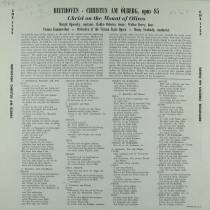
Henry Swoboda (October 29 1897 – August 13 1990) was a Czech conductor and musicologist. He made many recordings for the Westminster label, including the first commercially available record of Bruckner's Sixth Symphony. He worked from 1927 to 1931 for Electrola, Berlin and later as conductor for Radio-Prag. He was a Guestprofessor at University of Southern California between 1931-1939 and emigrated 1939 to the USA. Christus am Ölberge (in English, Christ on the Mount of Olives), Op. 85, is an oratorio by Ludwig van Beethoven portraying the emotional turmoil of Jesus in the garden of Gethsemane prior to his crucifixion. It was begun in the fall of 1802, after his completion of the Heiligenstadt Testament, as indicated by evidence in the Wielhorsky sketchbook. The libretto in German is by the poet Franz Xaver Huber, editor of the Wiener Zeitung, with whom Beethoven worked closely. It was quickly completed early the following year, and was first heard on April 5, 1803 and revised by Beethoven in 1811 for publication by Breitkopf & Härtel.
It is a much more humanistic portrayal of the Christ passion than other settings, such as those by Bach. The work concludes at the point of Jesus personally accepting his fate, placing the emphasis on his own decision rather than the later Crucifixion or Resurrection.
The structure of the work is interesting in that it is something of a dramatic oratorio rather than a religious choral mass or a dramatic opera. It is scored for SATB chorus, soprano, tenor, and bass soli, and orchestra. The tenor sings as Jesus, with the soprano as a seraph (angel) and the bass as Peter.
Beethoven was quite critical of the oratorio, thinking it too dramatic in nature and the orchestra and chorus too under-rehearsed in its premiere performance. He, too, panned Huber's libretto saying, "I would rather set Homer, Klopstock, Schiller to music. If they offer difficulties to overcome, these immortal poets are worthy of it." Huber agreed, saying, "I know that the text is extremely bad," and Beethoven waited almost ten years to publish the piece (explaining the relatively late Opus number). It is interesting to note that Beethoven eventually did set Schiller to music in his monumental Ninth Symphony, almost twenty years later.
Although the piece, Beethoven's only oratorio, enjoyed immediate public success following its premiere, it has since drifted into obscurity and is now rarely performed, being commonly regarded as being below Beethoven's usual standards of excellence. However, the "Welten singen..." finale chorus has enjoyed some popularity on its own, usually being rendered as an "Hallelujah".
Ludwig van Beethoven
Christus am Ölberge, Op. 85
Radko Delorco, tenor Walter Berry, bass Margit Opawsky, soprano Vienna State Opera Orchestra Vienna Kammerchor Henry Swoboda 1960's
| 
